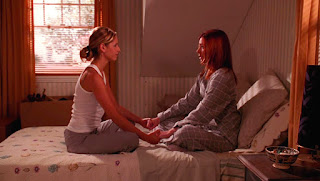You Slay Together
I suppose it’s not uncommon to be attached to the media that meant the most to you at a formative point in your life. My favorite band is Counting Crows. My favorite move is Angus. If I were forced to pick a single favorite book, I’d probably go with John Irving’s A Prayer for Owen Meany. I don’t hold any illusions about any of these selections being the best in their given genre, but they each share that I first fell in love with them between the ages of fourteen and eighteen. Not unlike my best friends, the things I hold most dear are not only the highest in quality or the most in sync with my present aesthetic, but were with me through good times and bad, and have held a place in my heart for two decades now.
To grow older—particularly in our present moment—is to reckon with the problematic nature of old favorites. In the realm of television alone, I can’t re-watch episodes of Friends without recognizing the rampant homophobia and misogyny. It’s hard to cheer on other sitcoms with Tim Allen or Kelsey Grammar playing the protagonists. And Buffy?
In addition to the goal posts for diversity and inclusivity shifting over time and rendering BtVS in a less positive light, there have been revelation after revelation that Joss Whedon wasn’t such a nice guy (putting it very diplomatically). The identity of Buffy the show is hard to extricate from its (it turns out evil) genius showrunner—and that’s not getting into other Whedon vehicles like Angel, Firefly, and Dollhouse that I also held dear.
So do we love a show like Buffy unconditionally, much like I’ve willfully turned a blind eye to many of pro wrestling’s most problematic pieces or given John Irving a pass for some questionable remarks (and diminishing quality of his books). Or do we put our foot down in a more principled manner, the way I haven’t engaged with texts by Junot Diaz since revelations about his poor behavior? There are always matters of convenience and personal taste at hand in conversations of cancel culture, like how I didn’t have to feel conflicted about denouncing Louie CK because I’d been pretty indifferent about his work anyway.
Rather than get into the weeds of whether or when it’s right to “cancel,” it feels more appropriate to discuss why I still hold BtVS dear across decades, across problematic issues for its mastermind, when I haven’t watched the whole show through in years , and doubt I watch more than two or three stand-alone episodes most years nowadays.
The central metaphor of Buffy--that high school and growing up are hell--and, moreover, that the people in your life spell the difference between it being a Hellmouth that swallows you whole and a series of monsters you slay together—still resonates with me. More than that, it’s foundational to what I believe about and how I walk through the world. (Spoiler alert to anyone who hasn’t watched the show all the way through and intends to:) the fact that the story begins with Buffy as a single girl up against the world, and ends with her as one of a cast of women holding the world on their shoulders together is beautiful and important for people to hear in whatever form is most palatable to them.
Indeed, I remember, as a teenager, wishing there were more Buffy. Not (only) more episodes, but more of getting to see these people interact outside of crisis, getting to live in their world a bit more in a way that wouldn’t be sustainable for a general audience, but that would make Willow and Xander feel even more like not just TV characters I liked, but people I knew.
I suppose all of the above is at the heart of my affection and dedication to this show. Growing up, I remember my sister guiding me to a number of my favorite bands (after all, she owned an audio cassette of August and Everything After before I could justify buying the CD when she left for college). My parents dictated most of what I watched on TV. Buffy the Vampire Slayer is about the only show I remember bringing into the house—finding, falling for, and over a series of episodes convincing at least my mother and sister that it wasn’t just about the attractive women in the cast, but actually much more about how good this show was.
So, this October, I’ll be sure to fire up at least one episode. Maybe a seasonally appropriate “Halloween” or “Fear Itself,” or maybe one of the campier monster-of-the-week episodes from season one or two. Regardless, I’ll remember this show once made me feel, and the unique capacity for a show like it to still facilitate me losing myself to my imagination—that demons just might be real, but so are friends good enough to help me stand up to them.


Comments
Post a Comment